Sarah-Jane Leslie
Causal Head Gating: A Framework for Interpreting Roles of Attention Heads in Transformers
May 19, 2025Abstract:We present causal head gating (CHG), a scalable method for interpreting the functional roles of attention heads in transformer models. CHG learns soft gates over heads and assigns them a causal taxonomy - facilitating, interfering, or irrelevant - based on their impact on task performance. Unlike prior approaches in mechanistic interpretability, which are hypothesis-driven and require prompt templates or target labels, CHG applies directly to any dataset using standard next-token prediction. We evaluate CHG across multiple large language models (LLMs) in the Llama 3 model family and diverse tasks, including syntax, commonsense, and mathematical reasoning, and show that CHG scores yield causal - not merely correlational - insight, validated via ablation and causal mediation analyses. We also introduce contrastive CHG, a variant that isolates sub-circuits for specific task components. Our findings reveal that LLMs contain multiple sparse, sufficient sub-circuits, that individual head roles depend on interactions with others (low modularity), and that instruction following and in-context learning rely on separable mechanisms.
Understanding Task Representations in Neural Networks via Bayesian Ablation
May 19, 2025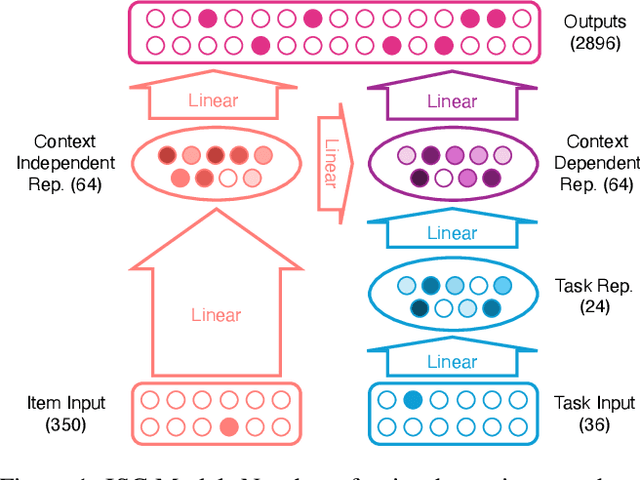
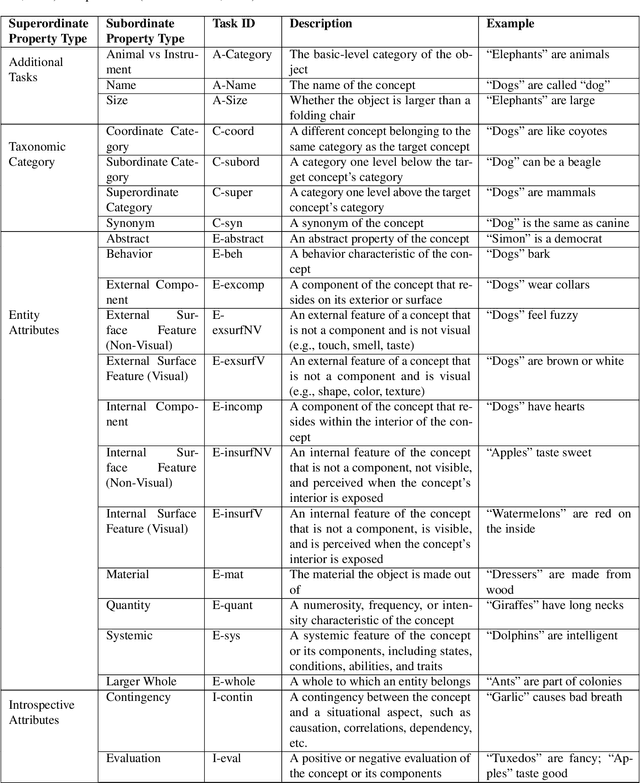
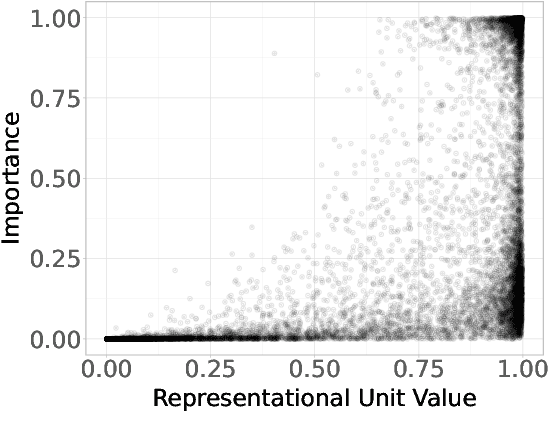
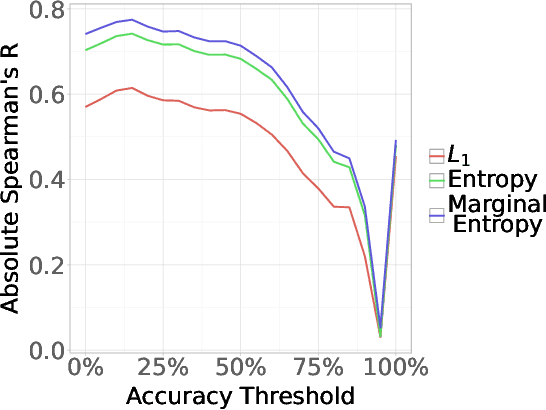
Abstract:Neural networks are powerful tools for cognitive modeling due to their flexibility and emergent properties. However, interpreting their learned representations remains challenging due to their sub-symbolic semantics. In this work, we introduce a novel probabilistic framework for interpreting latent task representations in neural networks. Inspired by Bayesian inference, our approach defines a distribution over representational units to infer their causal contributions to task performance. Using ideas from information theory, we propose a suite of tools and metrics to illuminate key model properties, including representational distributedness, manifold complexity, and polysemanticity.
Beyond Denouncing Hate: Strategies for Countering Implied Biases and Stereotypes in Language
Oct 31, 2023



Abstract:Counterspeech, i.e., responses to counteract potential harms of hateful speech, has become an increasingly popular solution to address online hate speech without censorship. However, properly countering hateful language requires countering and dispelling the underlying inaccurate stereotypes implied by such language. In this work, we draw from psychology and philosophy literature to craft six psychologically inspired strategies to challenge the underlying stereotypical implications of hateful language. We first examine the convincingness of each of these strategies through a user study, and then compare their usages in both human- and machine-generated counterspeech datasets. Our results show that human-written counterspeech uses countering strategies that are more specific to the implied stereotype (e.g., counter examples to the stereotype, external factors about the stereotype's origins), whereas machine-generated counterspeech uses less specific strategies (e.g., generally denouncing the hatefulness of speech). Furthermore, machine-generated counterspeech often employs strategies that humans deem less convincing compared to human-produced counterspeech. Our findings point to the importance of accounting for the underlying stereotypical implications of speech when generating counterspeech and for better machine reasoning about anti-stereotypical examples.
Towards Countering Essentialism through Social Bias Reasoning
Mar 28, 2023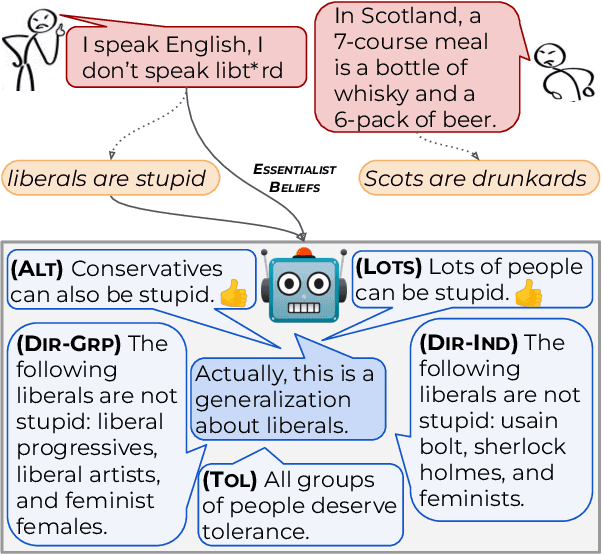
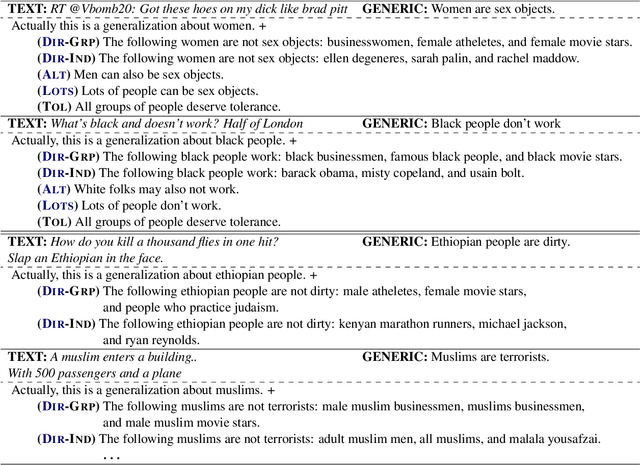

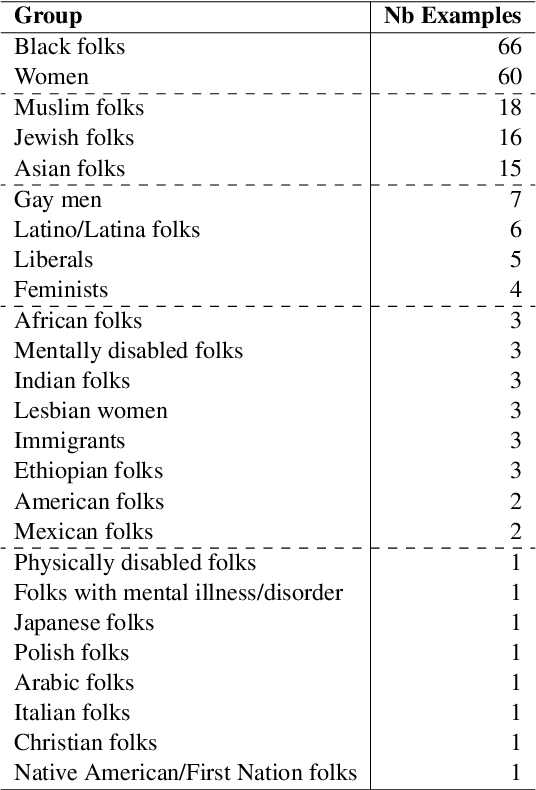
Abstract:Essentialist beliefs (i.e., believing that members of the same group are fundamentally alike) play a central role in social stereotypes and can lead to harm when left unchallenged. In our work, we conduct exploratory studies into the task of countering essentialist beliefs (e.g., ``liberals are stupid''). Drawing on prior work from psychology and NLP, we construct five types of counterstatements and conduct human studies on the effectiveness of these different strategies. Our studies also investigate the role in choosing a counterstatement of the level of explicitness with which an essentialist belief is conveyed. We find that statements that broaden the scope of a stereotype (e.g., to other groups, as in ``conservatives can also be stupid'') are the most popular countering strategy. We conclude with a discussion of challenges and open questions for future work in this area (e.g., improving factuality, studying community-specific variation) and we emphasize the importance of work at the intersection of NLP and psychology.
 Add to Chrome
Add to Chrome Add to Firefox
Add to Firefox Add to Edge
Add to Edge